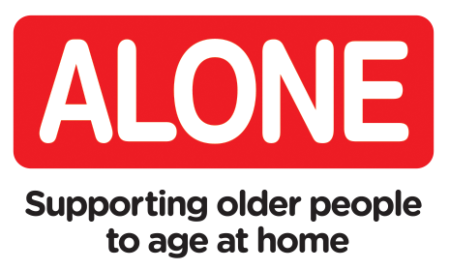
Language is important. How we talk about ageing and older people frames the way we think about them. And how we think shapes the policies we are prepared to support.
It’s time to rethink ageing as the success story that it is and look to the challenges not of an ageing population, but of systems that haven’t yet prepared for that success.
At ALONE we support older people to age at home. We are a national organisation and this year we will support 8,000 older people across the country who are struggling with issues such as loneliness, housing, and health difficulties, accessing services, and fuel poverty.
Older people face significant challenges, particularly in the areas of health, housing, and finances. As our population gets older, the number of people experiencing these difficulties will increase. But to really prepare to meet the support and social needs of increasing numbers of older people, we need to address the cultural and social backdrop in which these challenges arose.
We don’t want anyone to have to rely on charity. The people we serve at ALONE have worked, or in some cases struggled, all their lives. For others, things have changed as they have gotten older and they need support.
Many never thought they would be using our services in their old age. Others, now supported by ALONE in old age, have been dependent on the support of NGOs like us since childhood. That is how slow change is. Supporting older people starts with giving children and younger people the right start.
I feel that so many people object to things like social housing because they don’t understand that large numbers of people will work all their lives but never be able to afford to buy. They don’t know what it’s like to live on low wages or face health and other challenges while still striving to be a good citizen.
We must claim back the narrative on housing, health, and ageing. These are universal themes and our starting point is that everybody, or most people at least, have good intentions. By changing the narrative, the challenges we face become significantly more solvable — and become opportunities to revolutionise and hugely improve people’s experiences of ageing.
One of the biggest stumbling blocks we face is ageism in our language. For example, by describing people as ‘bed blockers’ we forget that there are people behind the waiting lists.
When we talk about ‘delayed discharges’ we are changing the name, but not the system.
We describe older people as ‘pensioners’, rather than as men and women, in articles describing those tragic situations when someone’s body has been found a number of weeks or months after they’ve died.
In describing older people in these terms, we also angle blame towards them rather than take responsibility that the needs of the public in health care, housing, and other areas have changed and our services need to respond before it is too late.

We need to examine the challenges that older people experience not with a tone of blame, but with empathy. We need to focus on how we can improve people’s experiences and quality of life, not how we can reduce waiting lists or defuse pension time bombs.
By using this type of language, we are avoiding taking these challenges seriously and really seeing how they impact the quality of life and experiences of older people. We need to balance realistic descriptions of the challenges older people experience with depicting them as the active contributors to society that they are.
Many people still have significant misconceptions about the experience of ageing, misconceptions that we see contradicted every day in our work.
Many still don’t recognise that the housing crisis is affecting people in their 70s and 80s, as well as younger people, and that receiving a notice to quit your rented property in your 80s is a very different experience to that in your 30s.
We see older people living in bigger homes with empty bedrooms and the onus is put on them to move out without any real choice of where to go. Pressure should, instead, be put on developers to build suitable, age-friendly one- and two-bedroom homes with supports that would enable that choice.
We describe A&E departments and GP waiting rooms as being filled with older people, rather than simply recognising them as the primary users of these services and designing them in a way that caters to their needs.
Worst of all, we discuss the pensions ‘time bomb’, or the increased pensions which will be paid by the State as the number of older people increases, in terms of the burden it will place on us rather than as a success. If we plan properly, not just for the increases in pension spending but in all age-related spending, through measures such as changing the tax base, there is no reason that this has to be a time bomb.
The facts here are not scary.
Our negative view of ageing and the support needs of older people has impacted on policy and policy implementation. The National Positive Ageing Strategy is still without any funding, six-and-a-half years after it was launched. We see the narrative surrounding support for older people in budgets gets reduced to whether a fiver will be added to the pension that year to get the ‘grey’ vote, rather than anything being done to benchmark the pension to ensure it will provide a reasonable standard of living in old age.
And we see discussions of home supports centred around how many additional hours are being delivered, rather than predicting demand and then building up the supply to match. Indeed, the fact that more than 900 fewer people are receiving these hours at the end of June this year compared to the year before highlights how language can be used to present a certain narrative.
An ageing population is not a catastrophe, and neither is ageing. It is to be celebrated, valued, supported, and planned for. We need to change the way we think and act, and we need to plan, now, so that we all can have a positive experience of getting older.
Seán Moynihan is CEO of ALONE. This article relates to a paper delivered at our 2019 Social Policy Conference and originally appeared as an opinion piece in the Irish Examiner on Tuesday November 26th 2019. You can see a video of his presentation and read the full paper here.


